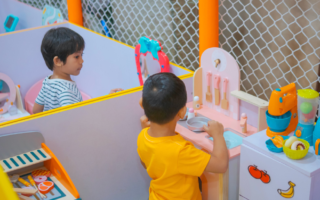Sibling relationships are among the most important bonds in life, shaping our emotional development and teaching us how to navigate social connections. While the sibling journey can be fraught with challenges, as a parent, you have the power to nurture relationships that are rooted in love, respect, and understanding.
This blog will explore 20 practical strategies to encourage positive sibling relationships, backed by personal insights, expert advice, and actionable tips
Growing up in a household with two brothers was a rollercoaster of emotions. We had days filled with laughter and camaraderie, but just as many were marked by petty squabbles and sibling rivalries.
I remember one specific Christmas morning when my older brother unwrapped a remote-control car, the very toy I’d been secretly hoping for. My jealousy boiled over, and I broke down in tears, ruining what was supposed to be a joyous occasion.
My parents stepped in, not with punishment but with wisdom. They taught us to share, to understand each other’s feelings, and to celebrate one another’s happiness.
Years later, as a father myself, I strive to pass on those lessons to my own children. These strategies are not just theories, they are the principles that helped me and my brothers transition from rivals to best friends.
Why Positive Sibling Relationships Matter
-
Lifelong Impact
Sibling relationships are often the longest-lasting relationships we have, outliving even our connections with parents and spouses.
-
Social and Emotional Development
Positive sibling interactions teach children key life skills, such as empathy, communication, and conflict resolution.
-
Mental Health Benefits
Strong sibling bonds can provide emotional support during challenging times, reducing feelings of loneliness and fostering resilience.
-
A Source of Joy
From shared family jokes to collaborative adventures, siblings create memories that bring lifelong joy and nostalgia.
20 Strategies to Encourage Positive Sibling Relationships
-
Set a Positive Example
Children observe and imitate parental behavior. Practice empathy, patience, and respect in your own relationships to model healthy interactions.
-
Encourage Teamwork
Assign group tasks like cleaning up toys or baking cookies together. Cooperative activities foster a sense of camaraderie and shared accomplishment.
-
Establish Conflict Resolution Rules
Teach siblings to “talk it out” by expressing their feelings, listening to each other, and working together to find solutions.
-
Celebrate Individuality
Recognize and appreciate each child’s unique traits and talents. This reduces competition and fosters mutual respect.
-
Create Shared Experiences
Plan activities like family game nights, camping trips, or movie marathons to encourage bonding.
-
Address Jealousy Proactively
When one child achieves something, involve the others in celebrating their success. This shifts focus from competition to shared pride.
-
Use Positive Reinforcement
Praise and reward siblings for demonstrating kindness, teamwork, or empathy. Positive feedback encourages repeat behavior.
-
Encourage Apologies and Forgiveness
Teach children to acknowledge their mistakes and seek forgiveness. This builds trust and emotional maturity.
-
Limit Comparisons
Avoid comparing siblings in terms of achievements, behaviors, or personality traits. Instead, celebrate their individual strengths.
-
Promote Shared Goals
Set family challenges, like completing a puzzle or saving for a pet, that require teamwork and cooperation.
-
Teach Empathy
Encourage children to consider each other’s feelings during conflicts. Role-playing scenarios can help younger kids understand empathy.
-
Establish Routines
Daily rituals, like saying goodnight to each other or sharing a bedtime story, strengthen sibling connections over time.
-
Give Them Tools for Problem-Solving
Provide children with phrases and techniques for resolving disagreements, like taking turns or creating compromise lists.
-
Provide Individual Attention
Spending one-on-one time with each child ensures they feel valued, reducing rivalry for your attention.
-
Respect Boundaries
Teach children to respect each other’s personal space and belongings. Boundaries foster mutual respect.
-
Involve Siblings in Decisions
Let them collaborate on family decisions, such as choosing a vacation destination or planning a weekend activity.
-
Highlight the Importance of Sibling Bonds
Share stories from your childhood or examples of famous sibling duos to illustrate the value of strong sibling relationships.
-
Avoid Taking Sides
When conflicts arise, avoid favoring one child. Instead, focus on mediating a fair resolution.
-
Foster Healthy Competition
Encourage friendly competition that emphasizes effort and teamwork, rather than winning at all costs.
-
Use Books and Media
Read books or watch movies that emphasize sibling relationships. Stories are a powerful way to teach lessons.
RECOMMENDED:
15 CREATIVE TODDLER MEAL IDEAS THAT ARE HEALTHY
FAQs
-
What if my children have a large age gap?
Focus on shared activities that suit both their developmental levels, like storytelling, art projects, or gardening.
-
How can I help siblings who constantly fight?
Analyze the root cause of their conflicts, establish ground rules for respectful communication, and schedule bonding activities.
-
Is sibling rivalry normal?
Yes, sibling rivalry is a natural part of growing up. The key is addressing it constructively to prevent long-term resentment.
-
What if one child feels overshadowed?
Spend time highlighting their unique strengths and encouraging the other siblings to celebrate their achievements.
PRACTICAL TIPS AND TOOLS
-
Sibling Bonding Games
Cooperative board games like Catan Junior or Pandemic promote teamwork.
-
Books About Sibling Love
Titles like The Berenstain Bears Get in a Fight or Charlie and Lola help illustrate positive sibling interactions.
-
Apps for Cooperation
Use apps like “Cozi Family Organizer” to assign shared tasks and track progress as a team.
-
Family Journals
Encourage siblings to write kind notes to each other in a shared journal.
OVERCOMING CHALLENGES
-
Busy Schedules
Even in packed schedules, carve out small moments for bonding, like chatting during car rides or having breakfast together.
-
Behavioral Issues
If one child struggles with behavioral challenges, involve them in creating solutions to foster accountability and inclusion.
-
Parental Fatigue
It’s okay to feel overwhelmed. Seek support from your partner or parenting communities when needed.
Positive sibling relationships are built on a foundation of love, respect, and teamwork. By implementing these 20 strategies, you’re not just preventing fights or resolving conflicts, you’re creating a family culture where siblings become lifelong friends.
Remember, as parents, your role is pivotal. Celebrate small wins, model kindness, and remain patient as your children grow and learn.
These efforts will pay off in the form of strong, supportive sibling relationships that stand the test of time.




